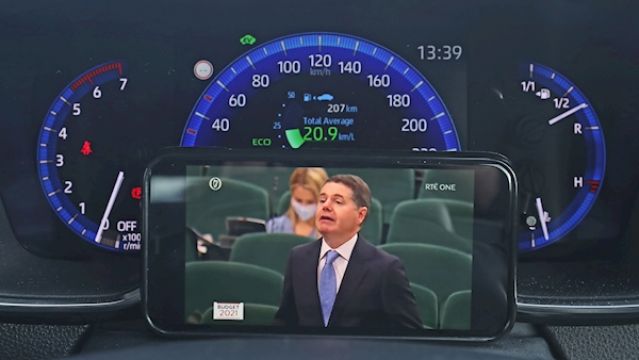Here is a summary of the main points.
Coronavirus, health and public services
– €8.5 billion has been committed to public services to address the challenges of Covid-19, including €2.1 billion in contingency funding.
– Another €3.8 billion will be spent on existing services, in particular the Department of Health. A recovery fund to stimulate demand and employment will be established at a value of €3.4 billion.
– The funding towards the health service will provide capacity for 100,000 Covid-19 tests per week and supply PPE.
– It will also allow for the creation of 1,146 extra acute beds and it will increase permanent adult critical care beds from 255 pre-Covid to 321 by the end of next year.
– Ireland will aim to secure around €2.5 billion from EU pandemic response funds to support the existing temporary wage subsidy scheme for workers.
– The employment wage subsidy scheme is set to expire on March 31st, 2021, but a similar scheme will be needed until the end of next year, Mr Donohoe said, with “no cliff edge” to the scheme.
– People receiving the pandemic unemployment payment (PUP) will be entitled to the social welfare Christmas bonus this year, if they have been in receipt of the payment for four months.
Personal taxation, wages and pensions
– Mr Donohoe said he was not making any broad changes to income tax credits or bands at this time.
– The ceiling of second USC band will rise from €20,484 to €20,687.
– The weekly threshold for the higher rate of employers PRSI will rise from €394 to €398.
– For the self-employed, Mr Donohoe said he would equalise the earned income credit with the PAYE credit by raising it by €150 to €1,650.
– People working from home will be able to claim tax deductions on utilities such as light, heating and possibly broadband.
– The rise in the pension age to 67 on January 1st, 2021 has been scrapped.
Further coverage on Budget 2021:Full details of an 'unprecedented' €17bn budget to support business, jobs and healthThe impact on motorists: An extra €1.51 on a fill of diesel and €1,000 on average new carReaction from the Opposition, business and industryWhat this year's budget means for the average worker
Tobacco, alcohol and fuel
– Cigarettes will go up by 50 cent, bringing the average cost of a packet to €14.
– There will be no change to the price of alcohol.
– The changes to carbon tax will add €1.51 to a 60-litre fill of diesel and €1.30 to a 60-litre fill of petrol. These apply from midnight on Tuesday night. The impact on other fuels will take effect from next May.
Business and industry
– Businesses hit by the pandemic will be able to avail of a Covid Restrictions Support Scheme (CRSS). The scheme will be subject to a maximum weekly payment of €5,000 and will be calculated on the basis of 10 per cent for the first million euro of turnover, and 5 per cent thereafter.
– Reduced VAT rate of 9 per cent for hospitality sector from November 1st until December 2021.
– The Knowledge Development Box relief will be extended for a further two years until the end of December 2022. The OECD-compliant intellectual property regime supports businesses in retaining and exploiting assets that have resulted from R&D activities in Ireland.
Environment and energy
– The accelerated capital allowances scheme for energy efficient equipment will be extended for a further three years. The energy efficiency criteria for the scheme will be re-assessed over the coming year.
– Carbon tax will be increased by €7.50 from €26 to €33.50 per tonne/CO2. This increase will be applied to auto fuels from tonight and all other fuels from May 1st, 2021.
– Vehicle registration tax and motor tax is to be reformed to incentivise electric and low-emission cars, and penalise polluters.
Housing, transport and infrastructure
– €5.2 billion will be spent on housing in 2021, an increase of €773 million.
– €500 million will be put toward building 9,500 social housing units in 2021.
– An affordability package for affordable housing and cost rental schemes worth €110 million will be introduced next year.
– €22 million will be spent on homelessness programmes, including additional beds.
– The help-to-buy scheme for housing will be extended until the end of 2021.
– A reduced stamp duty rate of 1 per cent on transfers of agricultural land between family members will be extended for a further three years.
– An additional €1 billion will be put aside for public transport in 2021.
Education
– The pupil-teacher ratios in schools will be brought down to 25:1 with funds for the creation of 565 new teacher positions.
– This is alongside funding to hire 990 special needs assistants and over 400 extra special education teachers.
– A new €50 million fund will provide a once-off financial assistance to full-time third level students, worth €250 each.
– Some €270 million will be spent on up to 20 projects in colleges and universities, and 145 school building projects will be delivered as well.
The state of the economy and public finances
– Mr Donohoe is anticipating that there will be no bilateral trade deal between the UK and the EU, which will reduce Irish growth by an estimated 3 per cent, to 1.75 per cent.
– It is also assumed that the coronavirus pandemic will continue in Ireland next year, and the absence of a widely available vaccine.
– GDP is projected to decline by 2.5 per cent for 2020 as a whole, with domestic demand falling by 6 per cent.
– The Department of Finance is forecasting a total loss of approximately 320,000 jobs in 2020, with this recovering by 155,000 jobs next year.
– €219 billion debt overall, equivalent to 108 per cent of national income. An increase of more than €20 billion on projections.







